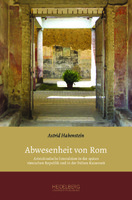Abwesenheit von Rom: Aristokratische Interaktion in der späten römischen Republik und in der frühen Kaiserzeit
Double-Blind-Peer-Review overseen by Publisher
Author(s)
Habenstein, Astrid
Collection
AG UniversitätsverlageLanguage
GermanAbstract
The immense ideological significance that the city of Rome held since the times of the late republic corresponded until the 2nd century AD with the actual supremacy of the urbs within the Imperium Romanum: Rome was the place where socially and politically influential players and groups met; it was where they tried to create an atmosphere of mutual understanding and agreement through complex ways of interaction. Until well into the imperial era the senatorial aristocracy considered the interacting presence of Rome as a major constant of their lifestyle. At least until the 1st century AD the emperors could not disengage themselves from the reference framework that the city was. Therefore, the forms and the reasons for aristocratic and imperial absence are of particular interest. Which role the absence of Rome played in the system of aristocratic interaction and which implications it had for politics and the society of the late republic and the early imperial era is the subject of the present study. Astrid Habenstein's work was awarded by the Historical Institute at the University of Bern with the prize for the best PhD-thesis in 2012. Der immensen ideellen Bedeutung, die der Stadt Rom seit der späten Republik zugemessen wurde, entsprach bis in das 2. Jhd. n. Chr. die reale Vorrangstellung der urbs im Imperium Romanum: In Rom trafen die gesellschaftlich und politisch maßgebenden Akteure und Gruppen aufeinander, hier versuchten sie in Form komplexer Interaktionen gegenseitiges Verständnis und Einvernehmen herzustellen. Bis in die Kaiserzeit betrachtete die Senatsaristokratie die interagierende Präsenz in Rom als wesentliche Größe ihrer Lebensführung. Zumindest im 1. Jhd. n. Chr. konnten sich auch die Kaiser nicht vom Referenzrahmen der Stadt lösen. Umso interessanter sind Formen und Anlässe aristokratischer oder kaiserlicher Absenz. Welche Funktionen die Abwesenheit von Rom im System der aristokratischen Interaktion hatte und welche Implikationen dies für Politik und Gesellschaft der späten Republik und frühen Kaiserzeit mit sich brachte, ist Gegenstand der vorliegenden Studie. Die Arbeit wurde 2012 mit dem Preis des Historischen Instituts der Universität Bern für die beste Dissertation des Jahres 2012 ausgezeichnet.
Keywords
princeps; rome; legitimation of power; principate; nobility; roman republic; roman empire; roman emporer; communication; Augustus; Marcus Tullius Cicero; Römischer Senat; Römisches Reich; Tiberius; VillaDOI
10.17885/heiup.43.32ISBN
9783946054009;9783946054023OCN
982228757Publisher
Heidelberg University Publishing (heiUP)Publisher website
https://heiup.uni-heidelberg.de/Publication date and place
Heidelberg, 2015Classification
History


 Download
Download